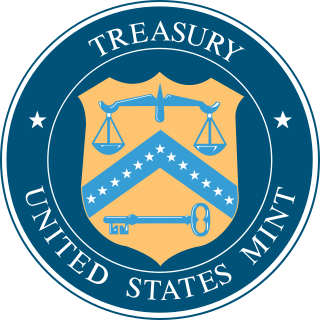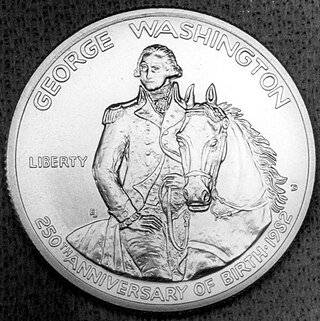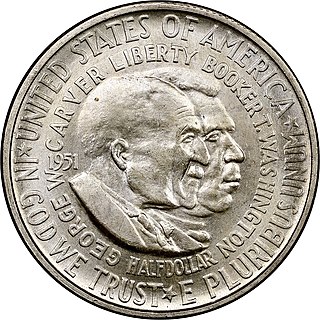
The United States Mint is a bureau of the Department of the Treasury responsible for producing coinage for the United States to conduct its trade and commerce, as well as controlling the movement of bullion. The U.S. Mint is one of two U.S. agencies that manufactures physical money. The other is the Bureau of Engraving and Printing, which prints paper currency. The first United States Mint was created in Philadelphia in 1792, and soon joined by other centers, whose coins were identified by their own mint marks. There are currently four active coin-producing mints: Philadelphia, Denver, San Francisco, and West Point.
The United States Mint has minted numerous commemorative coins to commemorate persons, places, events, and institutions since 1848. Many of these coins are not intended for general circulation, but are still legal tender. The mint also produces commemorative medals, which are similar to coins but do not have a face value, and therefore are not legal tender.

The Eisenhower Commemorative silver dollar is a United States commemorative coin minted in 1990 to celebrate the 100th Anniversary of the birth of General/President Dwight D. Eisenhower. This coin is not to be confused with the Eisenhower dollar or the Eisenhower Presidential dollar which were regular issue American coins.

The 1792 half disme is an American silver coin with a face value of five cents which was minted in 1792. Although it is subject to debate as to whether this was intended to be circulating coinage or instead an experimental issue, President George Washington referred to it as "a small beginning" and many of the coins eventually were released into circulation. It is widely considered the first United States coinage struck under authority of the Coinage Act of 1792.
Below are the mintage figures for the Washington quarter.

The United States Sesquicentennial coin issue consisted of a commemorative half dollar and quarter eagle struck in 1926 at the Philadelphia Mint for the 150th anniversary of American independence. The obverse of the half dollar features portraits of the first president, George Washington, and the president in 1926, Calvin Coolidge, making it the only American coin to depict a president in his lifetime.

The Arkansas Centennial half dollar is a commemorative fifty-cent piece struck by the United States Bureau of the Mint from 1935 to 1939. The coin was designed by Edward E. Burr and commemorates the 100th anniversary of Arkansas's admission to the Union in 1836.
The Louisiana Purchase Sesquicentennial half dollar was a proposed United States commemorative coin, legislation for which passed both houses of Congress, but was vetoed in 1954 by President Dwight Eisenhower. Intended to celebrate the 150th anniversary of the Louisiana Purchase (1803), the coin was lobbied for by both the Missouri Historical Society (MHS) and the Louisiana Purchase 150th Anniversary Association of New Orleans, who hoped to be able to buy the entire coin issue from the government and sell it at a profit.

The George Washington 250th Anniversary half dollar is a commemorative coin that was issued by the United States Mint in 1982 to commemorate the 250th anniversary of the birth of George Washington. The coin was authorized by Pub. L. 97–104.

The George Washington Carver-Booker T. Washington Half Dollar was designed by Isaac Scott Hathaway. The obverse depicts side-portraits of George Washington Carver and Booker T. Washington and the reverse shows a simple outline map of the United States of America superimposed with the letters "U.S.A.", and the words "Freedom and Opportunity for All/Americanism" around the rim. It was minted in silver from 1951 until 1954, by authority of Pub. L. 82–151. It was the final issue of early commemoratives.
The Gadsden Purchase half dollar was a proposed commemorative coin to be issued by the United States Bureau of the Mint. Legislation for the half dollar passed both houses of Congress in 1930 but was vetoed by President Herbert Hoover. The House of Representatives sustained his action, 96 votes in favor of overriding it to 243 opposed, well short of the necessary two-thirds majority. This was the first veto of Hoover's presidency and the first ever for a commemorative coin bill.

Everett Francis Drumright was an American diplomat who served in a variety of posts, including as U.S. Ambassador to the Republic of China (Taiwan).















